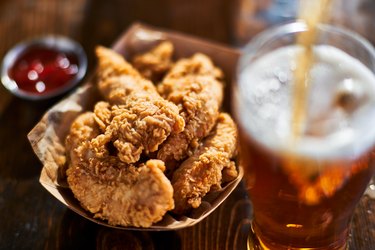
Oftentimes, a bout of diarrhea is brought on by a virus or infection. It can even be a side effect of some medications, according to the National Institute of Diabetes and Digestive Kidney Disease. But if you are experiencing loose, watery stools regularly, a food allergy, intolerance or eating certain foods in excess may be the cause.
It can be difficult to determine which specific foods are causing your frequent trips to the bathroom because what bothers one person may not affect another. If you find you're having regular bouts of diarrhea, keeping a food diary can help you identify the culprit. Here are six common foods that cause diarrhea.
Video of the Day
Video of the Day
1. Sugar-Free or Low-Sugar Diet Foods
Sugar substitutes like sorbitol, xylitol and maltitol are added to some diet foods labeled "sugar-free," "zero-sugar" or "low-sugar" to help keep the calorie and sugar content low and the level of sweetness high. You'll find these types of sweeteners in diet soda, light yogurts, and sugar-free gum and candies.
While the intention of sugar alcohols may be good, the side effects are less desirable. Loose stool is a common complaint with these types of sweeteners, according to Yale New Haven Health — especially when consumed in excess. Their digestion often results in pulling more water into our guts, resulting in watery stools.
2. Dairy
If eating ice cream, cheese or yogurt leaves you running to the bathroom, you may want to cut back on the dairy. An intolerance to lactose, the type of sugar found in dairy, is quite common. In fact, as many as 50 million American adults have lactose intolerance, according to the National Institutes of Health. In addition to diarrhea, you may also experience cramps, bloating, and nausea.
The good news is, there are many non-dairy alternatives to milk, cheese, yogurt, ice cream and other beloved options available on the market. Another alternative is taking a digestive enzyme supplement like Lactaid with dairy products.
3. FODMAPs
Foods high in FODMAPs (which stands for fermentable oligosaccharides, disaccharides, monosaccharides and polyols) can wreak havoc on the digestive system, especially for those living with IBS, which affects 10 to 15 percent of the world population, according to the International Foundation of Gastrointestinal Disorders.
FODMAPs are a group of sugars that are not completely digested, as explained by Monash University. This results in more water making its way into our GI tract and overproduction of gas, which can lead to bloating and diarrhea.
High-FODMAP foods include sugar alcohols and lactose; fructose, which is in higher concentration in some fruits and honey; and fructans and GOS-containing foods such as onions, legumes and wheat.
Related Reading
4. Fried or Fatty Foods
Pizza, burgers, fries, chicken wings and the like are high in fat, which isn't good for our hearts — or our guts. While one slice of pizza may not lead to diarrhea, eating large amounts of high-fat foods can be difficult for our GI tract to digest.
If our bodies struggle with digesting the fats from fatty foods, they eventually make their way to our colon, where they're broken down. This process can cause an influx of fluid, resulting in diarrhea, as explained by Harvard Health Publishing.
5. Alcohol
Having a few too many drinks can leave you with a raging headache the next day, yes, but you may find yourself stuck on the toilet, too.
Experiencing diarrhea after drinking alcohol can be due to a number of factors like excessive fluid intake, changes in the microbiome, irritation of the lining of our GI tract or even the impairment of the muscles in our guts (much how alcohol impairs other parts of our bodies).
For those who do drink alcohol, limit intake to a maximum of one drink per day for people assigned female at birth and two drinks a day for people assigned male at birth, according to the Centers for Disease Control.
6. Spicy Foods
Research shows hot and spicy foods may be good for you but the trouble is, not everyone can tolerate them. We're not just talking about being able to handle the heat in your mouth when you take a bite — spicy foods can also irritate the lining of our GI tract.
This is especially true with those who have IBS. Spicy peppers and seasonings can trigger symptoms such as diarrhea.
- National Institute of Diabetes and Digestive Kidney Disease: "Symptoms & Causes of Diarrhea"
- Yale New Haven Health: "Eat Any Sugar Alcohol Lately?"
- National Institutes of Health: "Lactose Intolerance: Information for Health Care Providers"
- Monash University: "FODMAPs and Irritable Bowel Syndrome"
- Harvard Health Publishing: "Is Something in Your Diet Causing Diarrhea?"
- Centers for Disease Control: "Alcohol Use and Your Health"
- nternational Foundation of Gastrointestinal Disorders: "Statistics"